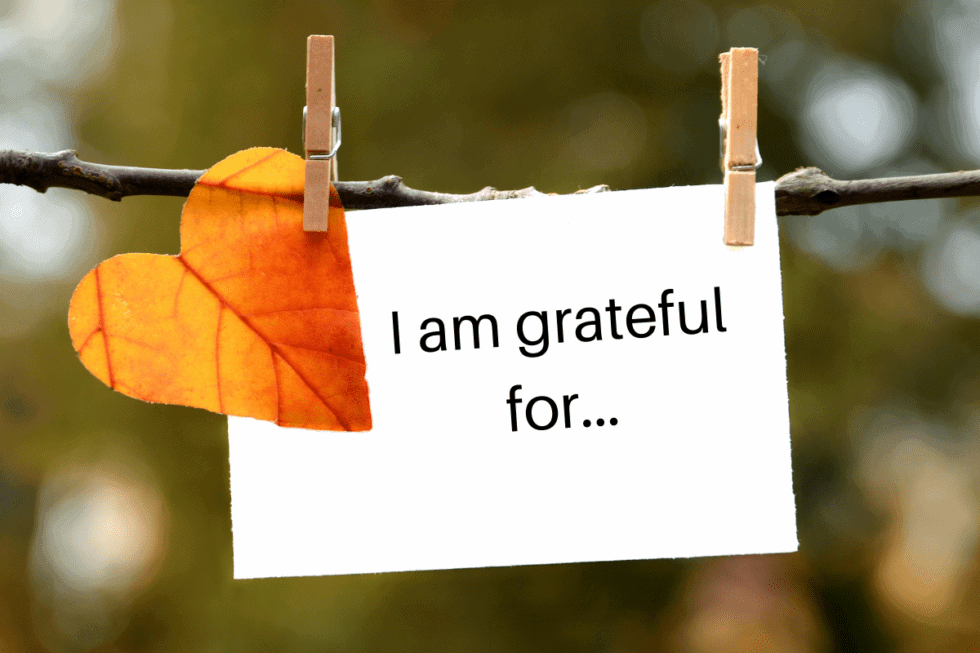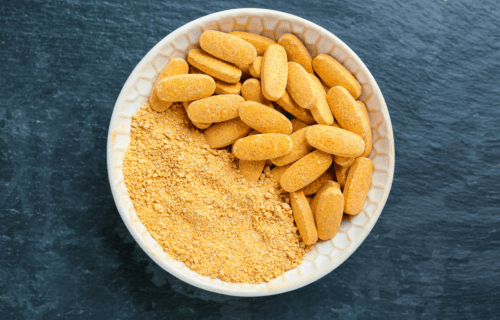
Using Gratitude to Calm Mast Cells – for those with Mast Cell Activation Syndrome and Histamine Intolerance
If you’re anything like me, you’ve had challenging days. Maybe a lot of challenging days.
Today I want to share something with you that helped me get through my challenging days. I hope it will help you, too!
When I was struggling the most with my health, hope and gratitude kept me going.
In the past, I’ve talked about how having hope helped get me through some really tough times. But there’s something else that helped me. It goes hand in hand with hope…gratitude.
Gratitude has been shown to have numerous benefits for your well-being!
Having a gratitude practice gave me the strength to keep hoping…no matter how many meltdowns I had.
And it turns out, it probably helped me in other ways, too. When I first started this gratitude practice, I didn’t know how much gratitude practices had been studied. I didn’t know all the ways I was actually helping myself…just by being grateful.
If you’ve been struggling, you might be wondering how in the world gratitude can really help your well-being.
And you might especially be wondering how this can calm your mast cells.
We’ll look at all of that today. First, I want to share a very personal experience with you. It’s about the time I went to India. It changed my life in unexpected ways…and it taught me a lot about gratitude.
Finding Deep Gratitude – for those with Mast Cell Activation Syndrome and Histamine Intolerance

About 15 years ago, I took a trip to India.
My health was already bad, and it was only getting worse. I probably shouldn’t have taken on such a big trip. But I had received a scholarship to study there. And I thought I might find some answers to help me with my health if I did go.
So, off I went.
And I did learn some big lessons when I was there…but they weren’t the lessons I had expected to learn…and I didn’t learn them through my studies.
What I learned, though, changed me permanently.
Specifically, it changed my experience of gratitude and hope.
India was like nothing else I’d seen before.
The level of poverty I saw in some areas was completely gut-wrenching.
At the time I took the trip to India, I was living below the poverty line by American standards.
In fact, the only reason I could afford to go to India was because of the scholarship.
But, even though I was poor in the United States, I was wealthy by comparison in India.
I could afford to spend $2 to sit in an air-conditioned movie theatre when I got over-heated.
I could afford to eat 3 meals every day. I had running water. A toilet that flushed. Toilet paper.
The majority of my neighbors in India had far less. In the area I stayed, some people had small houses but didn’t always have running water. Some people had food, but only enough for one meal a day.
There were also a lot of people nearby who lived in cardboard boxes. And monsoon season was coming. The only protection they had would be washed away with the rains.
On top of that, I could visibly see the toll hunger had taken on both adults and little children alike. The few organizations that offered food daily were far eclipsed by the number of starving people.
Seeing this kind of stark poverty made me grasp how truly fortunate I was.
Back home, I had a place I rented with heat, power, and running water. Even though I was limited in what I could eat, I still had access to nutritious food. Not only did I have food, I often had enough food to last me a week.
This trip was truly an eye-opening experience for me. I began to see my own life in a different way. I became deeply grateful for things I had just taken for granted before.
I don’t even know how to fully express that realization. I’d been grateful before for the clothes on my back, for food, for water. And I knew intellectually that there are millions around the world without this.
But this trip made me understand at a whole new level the amazing blessing it is to have heat, a roof, a warm bed, clean water anytime I want it, and food every single day.
I really don’t have words for it. I only have these immense feelings of overwhelming gratitude.
Being in India deepened my sense of gratitude in another way, too.
I mentioned that I was already in a state of poor health when I went to India. Now, if you’ve ever traveled outside of your home country, you know you are usually advised to be cautious with local water.
This includes being cautious when drinking tap water. It also means you should be cautious about eating raw vegetables washed in water. It can even mean not using tap water for brushing your teeth.
Some people have an “iron gut” and seem to be able to tolerate anything anywhere. But some of us are more sensitive.
In my case…a lot more sensitive.
One day, I mentioned to a fellow student that I was really craving raw veggies. She’d been to India several times already. She shared with me that she was fine when she ate salads from a certain restaurant.
So, I found that restaurant and ate the salad. But it turned out to be a very bad move for me.
I developed severe dysentery. I was nearly hospitalized because of the dehydration. It was scary being so ill so far away from home.
But, that turned into another lesson in gratitude.
While I was sick, other students, teachers, and local folks (all who barely knew me) checked on me. They brought me soups and rice. They brought me bottled water. They offered me words of encouragement and support.
I still get emotional when I think about how loving and giving people were with me.
When I returned home, I saw everything so differently.
The first time I showered, I felt a surge of thankfulness. I opened my mouth and let the purified water run across my teeth and tongue.
I had so much gratitude for something simple that I used to take for granted every day. I was so grateful for running water and being able to open my mouth in the shower without the risk of GI illness if I got a drop in my mouth.
I gratefully collapsed into my bed, feeling the blessing for the sheets, the mattress, the roof over my head.
I continued to carry that sense of gratitude with me long past my return home.
And that sense of gratitude ended up helping me in ways I never could have expected.
Here’s what happened. That bout with dysentery took my already poor health over the edge.
But every day, no matter how sick I felt, I remembered that I had so much to be grateful for. I even started two gratitude practices that I could do every day.
I’ll tell you about those in just a bit.
But, this gratitude had yet another gift for me.
This gratitude brought with it the strength and power of hope.
Hope that I would bounce back.
Hope that there was always something else I could try to recover my health.
Hope that as dark as life is sometimes, there is always someone kind out there.
Hope that somewhere, somehow, I’d find answers.
I want that for you, too. I want you to have the strength and power of hope.
I hope what I’ll share with you about gratitude and well-being will inspire you to give the gratitude practice a try.
Related Article: Forest Bathing Benefits for Mast Cell Activation Syndrome and Your Nervous System
Gratitude and Well-Being – info for those with Mast Cell Activation Syndrome or Histamine Intolerance

Practices like the Dream Jar can help you look at your hopes and dreams as a priority.
As I’ve mentioned in the past, hope is a powerful tool when it comes to getting better.
But as you think about what you want, it’s also good to reflect on what you already have. What do you have that you are grateful for?
Studies have shown that having a gratitude practice may help us reach our goals!
I get that it might be hard to think about gratitude if you can’t sleep, can barely eat, and are in constant pain.
But I hope you’ll keep reading to see how gratitude can make a difference in your well-being. And I’ll step you through how to get started.
First, though, let’s get back to what I mentioned earlier… what does science say about how gratitude practices may help you reach your health goals?
Gratitude and Goals
In one study on gratitude journaling, all participants were asked to make a short list of goals they wanted to accomplish over a two-month period.
Alongside making their list of goals, some of the participants were asked to complete a daily gratitude practice. These participants reported making more progress toward their goals than the participants who didn’t do the gratitude practice.
Another study suggested that gratitude may improve self-motivation. Being motivated is certainly helpful in reaching your goals!
When you have Mast Cell Activation Syndrome or Histamine Intolerance, you may have many different health goals over the course of time. Some will be bigger, and some will be smaller.
Related Article: Healthy New Year’s Resolutions for MCAS
I hope that you will be able to achieve them all!
I’m still working on a couple of my dreams, but I’ve already come so far.
Having a good mindset made a big difference for me. I see this with my clients, too. Those who make the biggest steps forward have hope AND a positive mindset.
Gratitude can help set that positive attitude.
But that’s not the only benefit of gratitude. Gratitude may also help support our nervous system!
Gratitude and the Nervous System
In my practice, I will often have my clients with Mast Cell Activation Syndrome and Histamine Intolerance start with nervous system supports. This has been a game changer for many of them.
We encounter stress in so many areas of our lives now. You might be stressed about political matters, family issues, or financial troubles, for example.
Having a chronic illness is very stressful, too. It brings a lot of worries and concerns. And many of us have chronic pain, which also increases stress levels significantly.
All of this keeps people with chronic illness in what’s often called the sympathetic nervous system state. This is thought of as the flight, fright, and freeze response.
Part of the nervous system work involves shifting out of the sympathetic state of flight, fright, and freeze.
You want to shift out of the sympathetic state and into the parasympathetic state. The parasympathetic state is the rest, heal, and digest response.
This parasympathetic state is required for your body to be able to restore and heal. I haven’t met anyone yet with Mast Cell Activation Syndrome who didn’t need at least a little help in getting there.
Here’s the good news.
Studies have suggested that maintaining a gratitude practice may increase parasympathetic activity.
So, gratitude may help you get to that state of rest, heal, and digest! And that helps you get on to the next stages of recovering your health!
The limbic system may be positively impacted by gratitude, too.
This is a part of your brain. It is responsible for processing memories and regulating emotions. It helps you sense danger, among other things.
And it’s a big factor in Mast Cell Activation Syndrome.
How does this affect your mast cells?
The limbic system sends signals to your mast cells. And just like mast cells can get dysregulated, your limbic system can get over-responsive.
When that happens, your limbic system sends a lot of danger signals to your mast cells. And this is a big part of what creates haywire mast cells.
Signs of limbic dysregulation are:
- Being easily startled
- Weak gag reflex OR overly strong gag reflex
- Sleep trouble/ waking up tired
- Trouble dealing with changes
- Feeling wired from too much conversation
- Loss of intestinal motility
- Any type of immune disorder
- Supplement and medication reactions
- Food reactions
But studies have shown the limbic system has been positively impacted by a daily gratitude practice!
That’s good news for your nervous system!
You can learn more about how to regulate all these parts of the nervous system for calmer mast cells in our online Mast Cell Nervous System Reboot!
So, a gratitude practice can be beneficial for the nervous system and in reaching your goals. Studies have also shown that practicing gratitude may help:
- reduce depression
- reduce anxiety
- boost feel-good hormones like serotonin
- better sleep
- create a better overall sense of well-being
Those are a lot of benefits!
So, how do you start a gratitude practice?
Let’s look at that next.
Related Article: What Is MCAS? Mast Cell Activation Syndrome Basics
Gratitude Practice – info for those with Mast Cell Activation Syndrome or Histamine Intolerance

There are so many ways you can incorporate gratitude practices in your life. For some, it can be reaching out to others to say thanks through email, phone calls, or greeting cards.
For others, they may find they express gratitude in prayer.
Still others express gratitude in acts of service or gifts.
The practice that was most studied, though, was the Gratitude Journal. I’ll get to that in just a bit.
But first, I want to help you get started. If you don’t know where to start, just start with something small.
You might even start with being grateful for something that feels ordinary to you. It might be:
- I have access to information because I have the internet. I’m grateful to be able to learn new things that may help my health.
- I am grateful for being able to look out the window to see birds flying.
- I’m grateful for warm water for my shower.
- I’m grateful there is sunshine.
- I’m grateful for a warm bed.
Or you might have people in your life you are grateful for.
- I’m grateful for my kids and their laughter.
- I’m grateful for my friend who brought me a book she thought I would like.
- I’m grateful for the stranger who held the door when my hands were full.
You can be grateful for any ways you have felt better, too.
- I’m grateful I could eat one new food yesterday.
- I’m grateful I felt a little less anxious today.
- I’m grateful I slept through the night.
You can be grateful for anything at all. If you feel a little stilted at first, that’s ok. It will start to feel more natural as you go on.
Or you might notice a smile on your face as soon as you think of the first thing you are grateful for. That’s ok, too! Allow yourself to experience that joy!
So, now that you’re thinking about what you are grateful for, what do you do next?
Start a Gratitude Journal.
The Gratitude Journal
A gratitude journal is a place to write or type out sentences expressing what you are grateful for. They can be simple sentences like the examples above. Or you can go more in depth. The key is that you stick to the positive.
Studies showed that those who wrote out hassles instead of gratitude didn’t see the same positive results. Sometimes, they were even negatively impacted. Those that just wrote things out factually usually remained neutral.
So, really focus on being grateful.
Keeping a gratitude journal is one of the practices I started as soon as I got back from India. I’m glad I started it when I did.
When I first started my gratitude practice, I didn’t know about all the benefits a gratitude journal could have. But I did see right away that it gave me the strength to keep hoping.
That was huge. Like I said, my health really started going downhill fast after that bout with dysentery.
I’ve heard that there are some online apps you can use as a gratitude journal, but I prefer pen and paper. (If you have EMF sensitivity, you may want to use a pen and paper over the cell phone, too.)
You can use any notebook and any format. You can use anything from plain black and white lined notebooks to bullet journals to blank journals with colorful pages (my favorite!)
Or you might prefer a guided book. Below you’ll find a few different ones to check out. I like using these types of guided books, sometimes, too.
The first option might be for you if you get overwhelmed easily. This Good Days Start with Gratitude Journal is very simple. It has just a small area to fill in each day. With only three lines to fill, it’s quick and easy.
It also has different quotations about gratitude throughout. I think that can be inspiring!
Below, you’ll find a different option. This 5-Minute Gratitude Journal might be suited to you if you are the type of person who sees a blank page and freezes. It’s also a good choice if you want to do more self-exploration.
This journal has quotations, affirmations, and prompts on each page. Prompts vary each day. They are different things like:
- Something that went right today…
- A sight, sound, or feeling that reminds me why life is so amazing…
- A second chance I’ve been given…
- Someone who’s given me hope…
One more option you may like is this Daily Gratitude Journal.
It gives you space to write what you are grateful for today as well as a place to reflect on what went well yesterday. It also has a spot for your self-care goals and a space to write your own affirmations.
The other great thing about keeping a gratitude journal? It’s your own personal pick-me-up. At any time, you can go back and look at all the things that make you smile.
Whatever you choose, remember to add something every day, however big or small. And it’s ok to repeat things. Some days, you might have ten things that come to mind. Other days, you might add one. Just keep it up every day.
Bonus Gratitude Practice
Here’s another gratitude practice I did when I was in a lot of pain or had trouble falling asleep.
I’d start with the letter A and think of something I was grateful for that started with the letter A. Then I would go to B. Then C.
This practice also helped me clear my mind. Coming up with things I was grateful for starting with the letter K, Q, X, or Z made me focus on something other than what I was dealing with. It would pull me out of the dark places I could slide into sometimes.
For me, today I’m grateful for my husband. He has been by my side through thick and thin.
I’m also grateful for my snuggly dogs who make me laugh.
I’m grateful I have a mold-free home now.
I’m grateful I could take a walk in the park this week.
And I’m deeply grateful for you being a part of our Mast Cell 360 Community so none of us have to walk this journey alone.
This brings me a lot of hope that, together, we can change the face of Mast Cell Activation Syndrome.
*Some links in this website are affiliate links, which means Mast Cell 360 may make a very small commission if you purchase through the link. It never costs you any more to purchase through the links, and we try to find the best deals we can. We only recommend products that we love and use personally or use in the Mast Cell 360 practice. Any commissions help support the newsletter, website, and ongoing research so Mast Cell 360 can continue to offer you free tips, recipes, and info. Thank you for your support!
More Encouragement for You
- Getting Back to Living Your Dreams
- Getting Support and Keeping Hope Alive
- Could these 3 Mast Cell Activation Syndrome Pain Reduction Support Tips Help You?
- Mast Cell 360 Hugs with Our Words Project
- Resonant Breathing
References for Using Gratitude to Calm Mast Cells – for those with Mast Cell Activation Syndrome and Histamine Intolerance
Emmons, R. A., & McCullough, M. E. (2003). Counting blessings versus burdens: an experimental investigation of gratitude and subjective well-being in daily life. Journal of personality and social psychology, 84(2), 377–389. https://doi.org/10.1037//0022-3514.84.2.377
Forsythe P. (2015). The parasympathetic nervous system as a regulator of mast cell function. Methods in molecular biology (Clifton, N.J.), 1220, 141–154. https://doi.org/10.1007/978-1-4939-1568-2_9
Harvard Health. (2021, August 14). Giving thanks can make you happier. Retrieved December 13, 2021, from https://www.health.harvard.edu/healthbeat/giving-thanks-can-make-you-happier
Kempuraj, D., Selvakumar, G. P., Thangavel, R., Ahmed, M. E., Zaheer, S., Raikwar, S. P., Iyer, S. S., Bhagavan, S. M., Beladakere-Ramaswamy, S., & Zaheer, A. (2017). Mast Cell Activation in Brain Injury, Stress, and Post-traumatic Stress Disorder and Alzheimer’s Disease Pathogenesis. Frontiers in neuroscience, 11, 703. https://doi.org/10.3389/fnins.2017.00703
Kyeong, S., Kim, J., Kim, D. J., Kim, H. E., & Kim, J. J. (2017). Effects of gratitude meditation on neural network functional connectivity and brain-heart coupling. Scientific reports, 7(1), 5058. https://doi.org/10.1038/s41598-017-05520-9
Khorrami, N., M. P. H. (2020, September 4). Gratitude and Its Impact on the Brain and Body. Psychology Today. Retrieved December 13, 2021, from https://www.psychologytoday.com/us/blog/comfort-gratitude/202009/gratitude-and-its-impact-the-brain-and-body
McCraty, R., & Childre, D. (2004). The Grateful Heart: The Psychophysiology of Appreciation. In R. A. Emmons & M. E. McCullough (Eds.), The psychology of gratitude (pp. 230–255). Oxford University Press.
Sheldon, K. M., Kashdan, T. B., & Steger, M. F. (2011). Designing Positive Psychology: Taking Stock and Moving Forward (Series in Positive Psychology) (1st ed.). Oxford University Press.
Siegle, L.P.C., S. (2020, May 29). The art of kindness. Mayo Clinic Health System. Retrieved December 10, 2021, from https://www.mayoclinichealthsystem.org/hometown-health/speaking-of-health/the-art-of-kindness
Team, W. (2020, August 13). Gratitude Can Boost Your Health: 5 Ways to Develop It. Cleveland Clinic. Retrieved December 13, 2021, from https://health.clevelandclinic.org/gratitude-can-boost-your-health-5-ways-to-develop-it/
Vanuytsel, T., van Wanrooy, S., Vanheel, H., Vanormelingen, C., Verschueren, S., Houben, E., Salim Rasoel, S., Tόth, J., Holvoet, L., Farré, R., Van Oudenhove, L., Boeckxstaens, G., Verbeke, K., & Tack, J. (2014). Psychological stress and corticotropin-releasing hormone increase intestinal permeability in humans by a mast cell-dependent mechanism. Gut, 63(8), 1293–1299. https://doi.org/10.1136/gutjnl-2013-305690




Thank you for sharing this information and your experiences with gratitude and MCAS. It is spot on with my own experiences. I started a gratitude journal 5 years after my MCAS, POTS and EDS diagnoses and soon found that my overall daily focus changed from constantly worrying about every move I made and every step I took and whether I would be able to function or whether I would melt down to instead living my life again without feeling as weighed down and burdened by these chronic illnesses. I credit gratitude journaling for helping to change my focus from its unhealthy inward direction to its now healthy outward focus. I am my healthiest and happiest since my diagnoses and have far fewer bad days and melt down far less. Gratitude journaling and expressing gratitude on a regular basis to others has been life changing and life saving for me!
Hi Melanie,
Thank you so much for sharing your experience!
Do you have any thoughts on DNRS or Gupta limbic system retraining programs?
Hi Stephanie,
Both are excellent programs. We really love the Gupta program and overall consensus is that it seems to be easier to get started with for beginners.
If you think that Gupta is the right choice for you, you can use this link with coupon code mastcell360 for $50 off.
https://www.guptaprogram.com/purchase-gupta-program/aff/40/?campaign=Purchaseprogram
Best wishes,
Suz, MC360